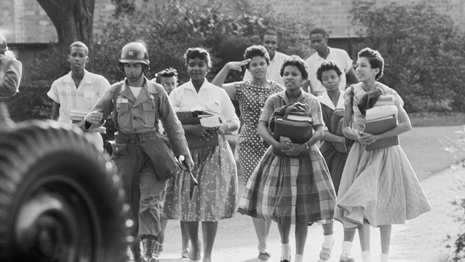Integration is important in order to allow all students to reach their full potential.
It wasn't until Brown v. Board of Education that students had the opportunity to rise out of the underprivileged education systems they were in. Brown v. Board of Ed. allowed students like Ruby Bridges and the Little Rock 9 to experience this integration in education. With this integration there were a lot of people who opposed integration.
All of the readings were very similar to one another because it dealt with the resegregation that exists in the 21st century. Although we have Brown v. Board of Education, segregation continues to exist. Such as the case of Normandy district. When the Normandy schools became unaccredited and the Transfer Law came into action, many students felt a relief. They would get the opportunity to reach their full potential because of the INTEGRATION of school districts. And would get the opportunity to leave segregated schools which have:
"...least qualified teachers, the least experienced teachers. They also get the worst course offerings, the least access to AP and upper level courses, the worst facilities. The other thing about most segregated black schools, Nikole says, is that they have high concentrations of children who grew up in poverty."
In podcast 563, we see INTEGRATION happening and the positive effects its having on the students education. Although as Herbert points out, "Long years of evidence show that poor kids of all ethnic backgrounds do better academically when they go to the school with their more affluent- that is, middle class- peers" , the integration of students in underperforming school to classrooms that provide better resources is a topic that most people turn their heads on.
Reflection
Prior to reading these articles I had some knowledge of the segregation that exists, but I always blamed it on the SES(socioeconomic status). While looking at this information I noticed a common theme of INTEGRATION. It was important in order to get these students to have the resources they need. Yet many people are unaware of the positive effects that integration can have for students living in a poverty stricken area.
While hearing the parents speak at the town meeting I was shocked by what they said; to me all they were saying was stereotypes. Stereotypes of students attending an underperforming school. There opposition, although not the exact same, reminded me of the opposition of parents in 1954 to integrate Blacks and Whites. Also reminded of the effect that stereotypes can have. Which were similar to the stereotypes held by the middle schoolers in the article In the Service of What?
When Nikole Hannah spoke about the resources provided for students in underprivileged schools, I automatically thought about the classroom I attend. 11 of the students in my class have IEPs, 11 of 26 of the students! While the teacher has to work with the students with IEPs, she also has most of the students who are underperforming, another factor she takes into account is the fact that she has students who are still learning English. All of these factors make it difficult for students to thrive in a classroom that is structured in a way that makes it difficult for students to reach their full potential without having ALL the resources they need.

Hey Jackie :) Great post. I like the video you provided as well
ReplyDeleteI love this post! You have a great video too and I love the way you spoke about your own experience here to back it up
ReplyDeleteI felt the same way when I heard the parents speak... great job this week! I enjoyed your blog
ReplyDelete